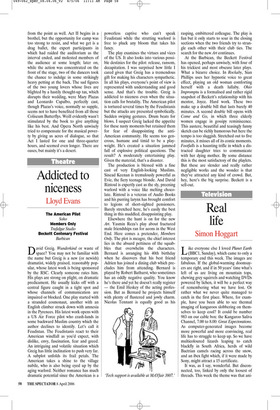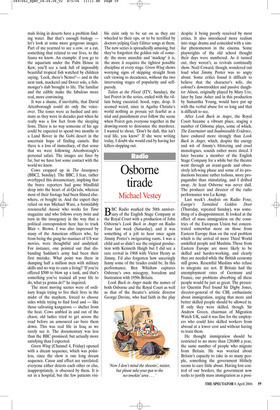Real life
Simon Hoggart
Like everyone else I loved Planet Earth (BBC1, Sunday), which came to only a temporary end this week. The images are fabulous. If the global-warming doomsayers are right, and if in 50 years’ time what’s left of us are living on mountain tops, chewing grey squirrels and watching DVDs powered by lichen, it will be a perfect way of remembering what we have lost. Or rather what we never quite managed to catch in the first place. Where, for example, have you been able to see thermal imaging of kangaroos slobbering on themselves to keep cool? It could be number 983 on our cable box: the Kangaroo Saliva Channel, 7.00 to 8.00: Great Expectorations. As computer-generated images become more powerful and more convincing, real life has to struggle to keep up. So we have multicoloured lizards leaping to catch blackfly in South Africa, herds of wild Bactrian camels racing across the snow, and an ibex fight which, if it were made by Sony, might attract a 15 certificate.
It was, as I say, wonderful. But disconnected, too, linked by only the loosest of threads. This week the theme was that ani mals living in deserts have a problem finding water. But that’s enough biology — let’s look at some more gorgeous images. Part of me yearned to see a cow, or a cat, something that related to our lives, to the fauna we know. An example: if you go to the aquarium under the Palm House in Kew, you’ll see a tank full of impossibly beautiful tropical fish watched by children saying, ‘Look, there’s Nemo!’— and in the next tank, mackerel and Dover sole, a fishmonger’s slab brought to life. The familiar and the edible make the fabulous more real, more convincing.
It was a shame, if inevitable, that David Attenborough could do only the voiceover. The tones were as hushed and intimate as they were in decades past when he really was a few feet from the sleeping lions. There is no way someone of his age could be expected to spend two months in a Land Rover in the Gobi desert in the uncertain hope of finding camels. But there is a loss of immediacy, of that sense that we were following Attenborough’s personal safari. The images are finer by far, but we have lost some contact with the world we knew.
Cows cropped up in The Insurgency (BBC2, Sunday). The BBC, I fear, rather overhyped this documentary, implying that the brave reporters had gone blindfold deep into the heart of al-Qa’eda, whereas most of their footage had been filmed elsewhere, or bought in. And the expert they relied on was Michael Ware, a formidably resourceful Aussie who works for Time magazine and who follows every twist and turn in the insurgency in the way that a political correspondent here has to track Blair v. Brown. I was also impressed by many of the American officers who, far from being the gung-ho maniacs of US war movies, were thoughtful and analytical. For instance, one pointed out that disbanding Saddam’s army had been their first mistake. What point was there in dumping half a million men with military skills and no way to earn a living? ‘If you’re offered $500 to blow up a tank, and that’s something you’ve trained all your life to do, what ya gonna do?’ he inquired.
The most moving scenes were of ordinary Iraqis trying to live their lives in the midst of the mayhem, forced to choose sides while trying to find food and — like those salivating kangaroos — shelter from the heat. Cows ambled in and out of the chaos; old ladies tried to get across the road before an armoured car bore them down. This was real life in Iraq as we rarely see it. The documentary was less than the BBC promised, but actually more satisfying than I expected.
Green Wing (Channel 4, Friday) opened with a dream sequence, which was pointless, since the show is one long dream sequence. Cause and effect are unrelated; everyone either detests each other or else, inappropriately, is obsessed by them. It is set in a hospital, but the few patients visi ble exist only to be sat on as they are wheeled to their ops, or to be terrified by doctors yelping Gary Glitter songs at them. The new series is sporadically amusing, but they’ve forgotten the golden rule of comedy: the more anarchic and ‘madcap’ it is, the more it requires the tightest possible discipline at every stage. Green Wing shows worrying signs of skipping straight from cult viewing to decadence, without the two intervening stages of popularity and selfparody.
Taken at the Flood (ITV, Sunday), the last Poirot in the series, ended with the villain being executed: hood, rope, drop. It seemed weird, since in Agatha Christie’s world nothing as prosaic yet fearful as a trial and punishment ever follow the scene when Poirot gets everyone together in the drawing-room to denounce the murderer. I wanted to shout, ‘Don’t be daft, this isn’t real life, you know!’ If she were writing today, I doubt she would end by having her killers slopping out.











































































 Previous page
Previous page